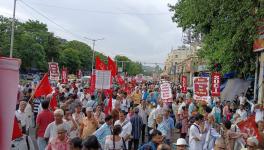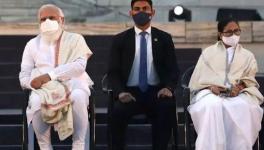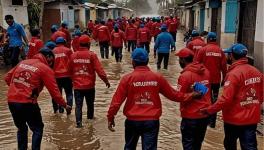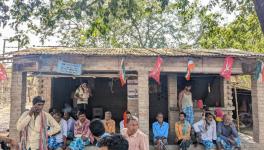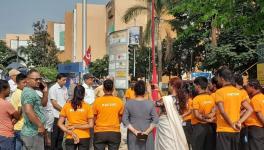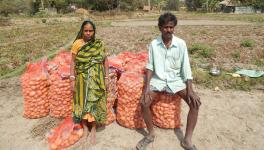Bengal: Intense Heat, Water Crisis Killing Paddy Seeds in Bankura, Purulia
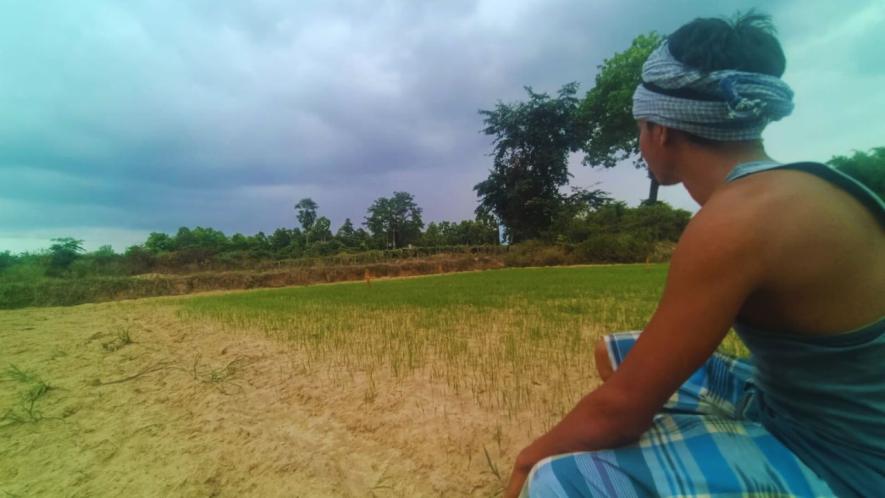
Aaman seed bed is in poor condition at Sakarkendi village of Manbazar 2 block under Purulia District.
Amid a delayed monsoon, Bankura and Purulia districts in West Bengal experienced intense heat in the last week of June with the temperature fluctuating between 36-40 degrees Celsius, accompanied by rising humidity. As a result, due to the lack of water, the seedbeds for Aaman paddy cultivation are scorched. Seasonal vegetables, too, are withering and dying in the fields.
Farmers, observing this deteriorating condition of their crops, are in distress. To sustain their families, some of them have been purchasing vegetables from outside vendors and selling them on bicycles. Even well-to-do farmers have turned into petty hawkers. Due to the non-production of vegetables, prices have skyrocketed, beyond the reach of marginal, poor, and lower-middle-class people.
This dire situation is common in most villages in these two districts in the Jangal Mahal region. Despite being aware of the situation, the government authorities and local panchayats remain mute spectators, raising inevitable questions across the two districts.
Condition of Farmers in Bankura and Purulia
Farmers in Manusmura village of Bankura can no longer save the seedbeds of Aaman paddy. This situation is widespread across large areas of these two districts, where Aaman paddy seeds have dried up or withered in the fields due to a lack of water. There is growing concern that Aaman farming will be destroyed before it even begins.
“Every day we come to the field early in the morning and late in the afternoon. We see that the Aaman seedlings have dried and turned yellow. Sometimes, there are dark clouds in the sky, but it does not rain. The seedlings would have survived had they received rainwater. As it stands now, even if it rains, the seedlings will not survive. We are exhausted and cannot find a way forward,” Shibaprasad Mahadani, a farmer from Manusmura village, told this reporter.
Farmers like Hemanta Mahato of Sakarkendi village, Santosh Mahato of Bhalibasa village under Manbazar 1 Block, Srimanto Banerjee of Bari village, and Patinath Tudu of Yomuma village under Manbazar 2 Block in Purulia district, shared similar same concerns. They expressed disappointment the seedbeds may not survive for lack of rain.
There is no major irrigation system in Purulia district to provide an alternative. Check dams, reservoirs, local ponds, and field wells have all dried up.
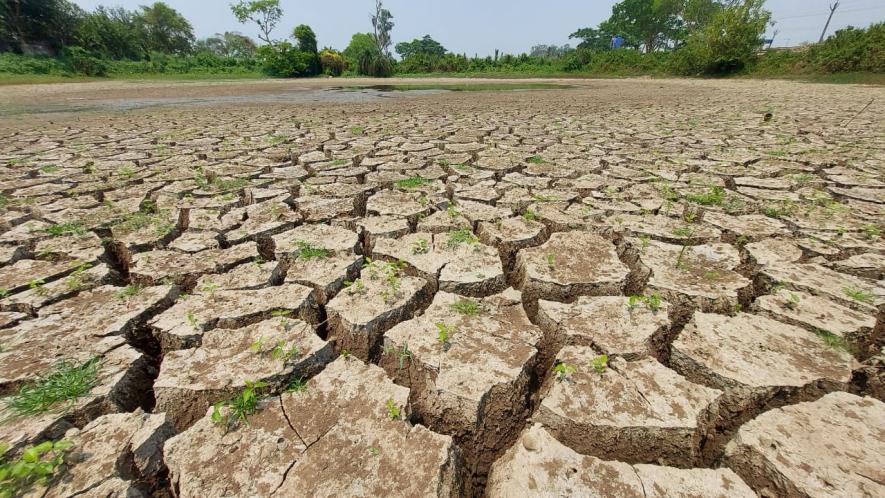
A dried Pond at Kochdihi village’s under Sonamukhi Block, Bankura.
Pradip Ray, a leader of the Communist Party of India (Marxist) in Purulia said this terrible situation was affecting the farming sector across the district.
The government officials concerned and panchayats remain mute spectators as the reservoirs for local irrigation, such as check dams, large ponds, and field wells constructed under the Mahatma Gandhi National Rural Employment Guarantee Act (MGNREGA) during the Left Front government, have not been renovated in time.
“The project has been inactive for the past three years. From where will farmers get water?" asked Jadunath Ray, secretary, Sarabharat Krishaksava Bankura District Committee, adding: “Cultivation in large parts of Bankura and Khatra sub-divisions were severely impacted.”
The main agricultural crop in Bankura and Purulia districts is Aaman paddy. Only parts of the Banjora, Patrasayer, Indas, and Sonamukhi blocks in the Bishnupur sub-division of Bankura district cultivate Boro paddy under Damodar Valley Corporation (DVC) irrigation and locally arranged submersible water.
Purulia district does not receive any irrigation water from Kangsaboti, despite water flowing from Purulia and accumulating in the Kangsaboti reservoir. For reasons unknown, after the Trinamool Congress-led government came to power, no water has been allocated from Kangsaboti for Boro and Rabi cultivation. In October, the water from this reservoir is released into the river, which is a total waste. As a result, there is no water in the Kangsaboti reservoir during the preparation of Aaman seedbeds.
Manusmura village is located 5 kilometres from the eastern edge of the district headquarters, Bankura Town. About 120 families live in this village, 82 of which are farmer families. None of these families have more than 10 bighas of cultivable land. The remaining families are farm labourers.
"Our entire village depends on agriculture. Only three persons are in government service. Only if the farmers cultivate, the farm labourers get work. This year, the farmers' land is almost dry, so labourers have no work in our village," Prasanto Patra, a small farmer from this village said.
While this reporter was talking to Prasanto Patra in the village, other farmers, including Kanai Patra, Madhusudan Ghose, and Bablu Mondal, mentioned that Manusmura village has been a leading vegetable cultivation area for a long time. Summer season vegetables, like brinjal, potol (pointed gourd), borboti (string beans), dharos (lady’s finger), karola (bitter gourd), and shak (varieties of spinach) are produced in large quantities and supplied to nearby Bankura Town throughout the year.
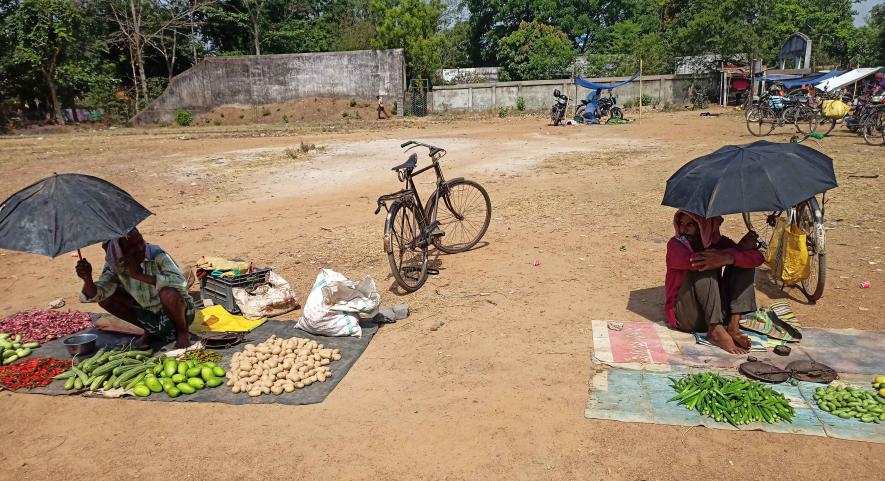
Farmers turned vegetable sellers at Kenduadihi in Bankura.
They said vegetable traders from outside used to come to these villages to buy the produce. Now, the situation has reversed; farmers from this village go to wholesale markets far away to buy vegetables, which they sell on their bicycles from village to village or in markets.
"This is how we sustain our families, but we do not know how long we can continue. The reality is that accomplished and well-to-do farmers have now turned into small vegetable sellers," they said.
Chittaranjan Ghose, a small farmer, said he was trying hard to save his pui shak (Malabar spinach) by spraying pesticides. "I am using expensive pesticides, but I know these will not survive. No matter how much fertilisers and pesticides you use, without water, crop death is inevitable," said.
Ghose said it costs about Rs 2,000 to plant an Aaman seedbed on one bigha of land. About 400 bighas of land are cultivated with Aaman paddy, and almost all seeds are destroyed.
Farmer Bablu Mondal said the heatwave was increasing rapidly year after year. There is no rain when needed, and when it does rain, it is of no use to the crops and can even damage them. No necessary measures are being taken to provide irrigation water, he added.
Several farmers, including an elderly woman. Usha Ghose, said ponds in their village were in a dirty condition, and no renovation was taking place. The River Lifting Irrigation (RLI) project built for their irrigation from the Darakeshwar River is now non-functional due to a lack of water in the river.
Farm labourers from this village, including Babu Mal, Pranab Bauri and Pratima Mal, said they used to plant and harvest crops in the village most days of the year. This year, there is no work.
“The 100-day work (MGNREGA) provided by the panchayat has been halted for three years. We do not receive any other job opportunities from the panchayat. Where do we go? We spend our days in a helpless state. If the farmers do not survive, we will not survive," said Pratima Mal. Several farm labourers across Bankura and Purulia villages echoed similar concerns.
When asked, Bankura District Agriculture Officer Narayan Mondal acknowledged that this year, rainfall had been less than last year. Reports indicate that many vegetables are perishing and Aaman seeds are drying up. He said the agriculture department was trying to help farmers grow crops that require less water. However, this message has not reached the farmers. Several farmers in Bankura District alleged that no officer or staff from the department concerned have visited the fields.
Drinking Water Crisis in Bankura
West Bengal Chief Minister Mamata Banerjee has often claimed that there is no shortage of drinking water in Bankura district. However, the ground reality is different. In many villages, tube wells are in a poor condition, and no new ones have been installed. Additionally, renovation of damaged tube wells has stopped. According to the Public Health and Engineering Department, water is supposed to be supplied through pipelines. However, most villages do not receive drinking water through these pipelines daily, as per their needs.
Despite informing the water supply department and local panchayats, residents allege that water supply is irregular. Water is often supplied by tankers, which is insufficient to meet the demand. Over the past two months, frustrated residents have blocked roads to protest the lack of drinking water in several places, including Bankura Junbedia village, Mejia, Saltora, Gangajalghati, Barjora, Sarenga, Ranibandh, Hirbandh, Khatra, and Raipur.
Manusmura village, for example, has six tube wells, all of which are in severe disrepair. The water from these wells contains so much iron that it is undrinkable. Residents have to fetch water from distant sources for cooking and drinking.
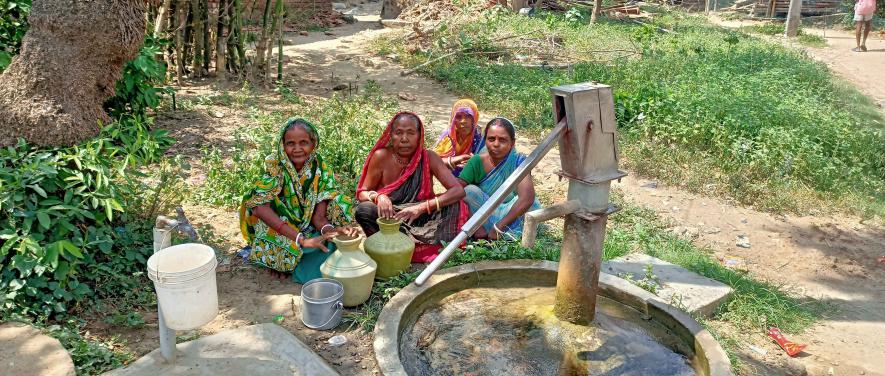
Women Waiting for Sajaldhara water at Manusmura village
Several women from Mal and Bauri Para, where most farm labourers live, have resorted to digging in the sand of a "khal" (a small water source) to collect water. Housewives Sukuntala Mal, Namita Bauri, and Sampa Mal said, “No more than three buckets of water are available. We cook, drink, and bathe using the water collected from hand-digging.”
There is pipeline water, but its availability is unpredictable. “We have informed the panchayat authority several times, but no step has been taken yet,” said Sukuntala Mal, noting that pipeline water was available only twice in the past month.
When asked, Additional District Magistrate of Bankura (General) Nakul Mahato assured that the administration would strive to ensure smooth supply of drinking water to Manusmura village. An elected official from the Jagdolla Gram Panchayat, who wished to remain anonymous, provided the same assurance. All the hapless people want from the administration and panchayat is that they should keep their promise of smooth supply of drinking water.
The writer covers the Jangal Mahal region for ‘Ganashakti’ newspaper in West Bengal.
(All pics by Madhu Sudan Chatterjee)
Get the latest reports & analysis with people's perspective on Protests, movements & deep analytical videos, discussions of the current affairs in your Telegram app. Subscribe to NewsClick's Telegram channel & get Real-Time updates on stories, as they get published on our website.









